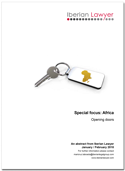Special focus Africa 2018: Opening doors
The diversification of African economies against a background of falling oil prices is generating opportunities for lawyers in a wider range of sectors – however, success in these markets depends on overcoming the challenge of forming a partnership with a good local law firm
While oil and gas-related work continues to be a key source of revenue for law firms operating in Africa, governments’ attempts to diversify their economies mean significant opportunities are being generated in the infrastructure, M&A, shipping, aviation and financial sectors. However, it is vital that Portuguese law firms partner with a local firm when conducting business in Africa, but this is not always easy. 
The drop in crude oil prices means Africa’s major oil-exporting nations are pursuing economic diversification strategies, with Angola being a case in point. Oil represents a third of the country´s GDP, and reduced oil revenues have resulted in the country growing at a slower rate in recent years, from an annual average of 10.3 per cent to an average of 1.5 per cent since 2015, according to figures published by The World Bank. The government has responded by providing support for other industries and developing infrastructure such as the Porto do Caio deep-water port, the country´s first public-private partnership (PPP) project. According to MLGTS partner Luís Gagliardini Graça, Porto do Caio is expected to “transform the entire continent’s trade and logistics routes”. He adds: “These large-scale projects are a critical component in Angola’s drive towards economic diversification, as well as indicative of the country’s confidence in embracing private equity.”
 New breed of investor
New breed of investor
It is also anticipated that M&A in Angola will generate significant work for lawyers. Francisco Ferraz de Carvalho, partner and head of Linklaters´ Lusophone Africa desk, says: “Angola will become more open to a new type of investor, and with that many opportunities will arise for law firms with Lusophone expertise.” Gagliardini Graça adds: “African legal work is no longer solely concentrated on traditional infrastructure projects and natural resources-related deals and disputes; increasingly, counsels are being engaged by private equity funds and other international investors doing deals in the consumer, technology and financial services sectors.”
Meanwhile, in Mozambique, large-scale infrastructure projects such as the Nacala Corridor project and the Coral floating LNG (liquefied natural gas) facility continue to generate work for law firms. “Nacala is the biggest logistics infrastructure project ever financed in Africa, and Coral is the world’s first floating LNG project to be financed,” says Ferraz de Carvalho. “It is hard to believe that both have happened in the same year in the same country – this has an immediate impact not only in Mozambique, but in the whole Southern African region in terms of boosting investor confidence,” he adds.
Declining oil prices have also led to African governments embarking on privatisation drives. Angola is restructuring state-owned firms such as oil producer Sonangol, while the Kenyan government is looking to sell a stake in the state-owned National Oil Corporation. In Mozambique, state-owned fuel distributor Petromac is being sold, while the country is also undergoing a debt restructuring process. Rui Amendoeira, partner at Vieira de Almeida in Lisbon, says: “The crisis has created opportunities because it forced governments to privatise and restructure state-owned companies, not just in the energy sector but also in the shipping, aviation and financial industries.”
Liberalising financial markets
The creation of central banks as well as the liberalisation of financial markets are among the other steps governments across Africa are taking in the name of economic reform. “Angola and Mozambique have made great strides in implementing economic reforms in the past decade, including independent central banks, financial market liberalisation and budget deficit management,” says Gagliardini Graça. MLGTS consultant Claudia Santos Cruz adds: “We have seen several actions from Mozambique´s Central Bank, such as tightening its monetary position due to low foreign exchange reserves, inflationary pressures, currency devaluation and weak banking institutions – at the moment, the local banking sector is stable.”
While the economic reforms in Mozambique have gone some way to boosting investor confidence, the country still faces barriers when it comes to securing international finance. Miguel Spinola, partner and head of PLMJ´s Mozambique desk, says: “There are a lot of expectations in Mozambique, and measures and reforms have been undertaken for investors to feel more comfortable. However, the country still suffers structural problems in terms of finance, and faces difficulties in accessing the international markets to increase national debt.” 
With regard to Angola, lawyers believe that investor confidence will be boosted by the fact that in November 2017, the International Monetary Fund announced it will assist the country with macro-economic improvements, budgetary consolidation, monetary and exchange rate adjustment and the promotion of the country to investors. “Everyone is looking forward to this assistance, which will help the country from a technical and management perspective as well as a financial one,” says Bruno Xavier de Pina, head of PLMJ´s Angola desk. “It will improve compliance standards and the country’s reputation, and our clients are showing a lot of interest.” Meanwhile, Santos Cruz points out that the Angolan government has also taken the step of altering the minimum capital requirements for FDI (foreign direct investment) as “an added incentive for foreign investors”.
Fighting corruption
Recent political developments are also having an impact on the market, according to Miranda managing partner Diogo Xavier da Cunha. “The end of the reigns of two of the oldest heads of state in African countries (in Angola and Zimbabwe) cannot be ignored,” he says. “Especially when these changes have been coupled with strong rhetoric against corruption and the privilege of the political elite, while at the same time advocating openness to foreign investment and private initiative.” Law firms and investors operating in Africa still face many challenges, not least cultural differences, lawyers say. According Xavier da Cunha, clients often “commit the sin of trying to impose their own way of thinking and doing things”. He continues: “There is of course nothing wrong in trying to implement best international practices in African countries, and generally there is a lot of openness to that, but you need to understand the expectations of your counterparts and work with them to find appropriate solutions.” Xavier da Cunha adds that, simply trying to “impose solutions without appropriate engagement with local stakeholders” is not the right approach.
Law firms and investors operating in Africa still face many challenges, not least cultural differences, lawyers say. According Xavier da Cunha, clients often “commit the sin of trying to impose their own way of thinking and doing things”. He continues: “There is of course nothing wrong in trying to implement best international practices in African countries, and generally there is a lot of openness to that, but you need to understand the expectations of your counterparts and work with them to find appropriate solutions.” Xavier da Cunha adds that, simply trying to “impose solutions without appropriate engagement with local stakeholders” is not the right approach.
Trial and error
Cultural differences can also be an obstacle when searching for a suitable local partner, a key requirement for law firms in many African jurisdictions. “Finding a good cultural match is not easy, it´s a trial and error exercise,” says Amendoeira. “There is a shortage of local law firms with international experience and the will to integrate,” he adds. Meanwhile, timing and cost are other issues, according to Ferraz de Carvalho. “Projects in Africa often take more time to implement than expected, and with that comes increased cost and loss of revenue,” he explains. “Also, given the volatility of some African markets, clients need to have the financial strength to go through the less favourable periods and not expect high returns in the short term.” However, Xavier da Cunha argues that the risks are no greater than those in other emerging economies. “It is a misconception [that the risk is greater], in fact studies by the World Bank indicate that doing business in many African countries is no more difficult than in many Latin American or Asian markets.”












